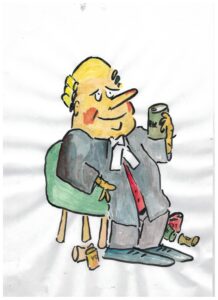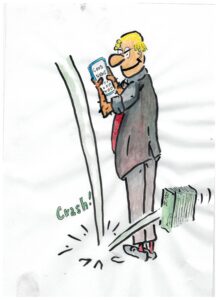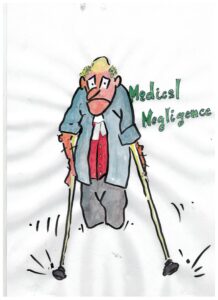Legal Nature of the Rule in Houldsworth
- 2014-01-26
- By whiggs
- Posted in Fundraising (Chapter 6D)
Helpfully explained by Merkel, Weinberg and Kenny JJ
In summary, the rule in Houldsworth prevents a person who is a shareholder from claiming a debt, or making a claim, against the company in that person’s capacity as a shareholder of the company if payment of the debt or claim will directly or indirectly recoup the money subscribed by the shareholder for the shares acquired by it.
Cadence Asset Management Pty Ltd v Concept Sports Limited [2005] FCAFC 265; see [9] to 019]
The question in the appeal was whether a subscriber for shares offered pursuant to a prospectus can recover from the company that issued the prospectus the loss suffered as a result of the subscription without the subscriber rescinding the contract to acquire the shares. The question is of some importance as a subscriber can no longer rescind the contract pursuant to which it acquired the shares if the shares have been sold by the subscriber, or if the company that issued the prospectus is in liquidation.
The rule in Houldsworth was considered by the High Court in Webb Distributors (Aust) Pty Ltd & Ors v The State of Victoria & Anor [1993] HCA 61; (1993) 179 CLR 15 (‘Webb’), which concerned claims which would ground an action in deceit or under s 52 of the Trade Practices Act 1974 (Cth) (‘TPA’) for unliquidated damages by shareholders who acquired their shares in certain building societies in reliance upon misleading and deceptive conduct by the societies. The liquidator of the societies sought directions in relation to two questions:
(a) whether the unliquidated damages claimed by the shareholders against the societies were provable in the liquidation; and
(b) whether the shareholders were precluded from prosecuting an action for damages against the building societies in relation to the acquisition of their shares.
Webb was an appeal against the decision of the Appeal Division of the Supreme Court of Victoria in State of Victoria v Hodgson & Ors [1992] VicRp 89;[1992] 2 VR 613 (‘Hodgson’). The Appeal Division found that the questions should be answered:
(a) No; and
(b) Yes.
In Webb, the High Court dismissed the appeal. In the majority judgment, Mason CJ, Deane, Dawson and Toohey JJ applied s 360(1) of the Companies (Victoria) Code (‘the Companies Code’) to the liquidation of the building societies. Section 360(1) provided that, on the winding up of a company, members are liable to contribute to the company’s debt subject to certain qualifications, including:
‘(e) in the case of a company limited by shares, no contribution is required from a member exceeding the amount (if any) unpaid on the shares in respect of which he is liable as a present or past member;
…
(k) a sum due to a member in his capacity as a member by way of dividends, profits or otherwise shall not be treated as a debt of the company payable to that member in a case of competition between himself and any other creditor who is not a member, but any such sum may be taken into account for the purpose of the final adjustment of the rights of the contributories among themselves.’
In Webb, the majority judgment made the following observations (at 33-35) in respect of s 360(1)(e) and (k), which are now substantially reflected in ss 516 and s 563A of the Act:
‘Section 360 imposes an obligation on members to contribute to the payment of all the liabilities of a company on its liquidation. Paragraph (e) limits that obligation to the amount unpaid on the members’ shares. Paragraph (k) subordinates sums due to a member in his or her capacity as a member to sums due to non-members.
In In re Addlestone Linoleum Co some members sought leave to tender proofs on the winding up against the company for damages for breach of contract in relation to the issue of shares in respect of which they had become contributories. At first instance Kay J held that the sums claimed fell within s 38(7) of the Companies Act 1862, which is, in all material respects, identical to s 360(1)(k). Kay J said:
“Now, unquestionably the applicants — retaining these shares and claiming damages because the shares are not exactly what they were represented to be — are making such claims in the character of members of the company, and the only question is whether such claims are for sums due `by way of dividends, profits, or otherwise’.”
His Lordship then went on to hold that that question should be answered in the affirmative because the applicants were seeking to recover a dividend in respect of the share capital which they were compelled to pay on the winding up. In practice, this would have meant recovery from the pockets of creditors of the share capital that they, as contributories, were liable to pay. The Court of Appeal dismissed an appeal from the decision of Kay J, principally by reference to the decision in Houldsworth. However, Lopes LJ agreed with the construction placed upon s 38(7) by Kay J. And Cotton LJ, with reference to the applicants, stated that “now they come here as shareholders, and in substance retain their shares, and seek to sue the company for breach of the contract under which they took them”. In our view, s 360(1)(k) bears the same interpretation as that which Kay J held s 38(7) of the Companies Act 1862 to bear.
In so far as it is relevant, the subsequent legislative history has supported this interpretation of s 360(1)(k). Section 563A of the Corporations Lawappears under the heading “Priorities” and differs from s 360(1)(k) of the Code in that it draws more strongly on the language of priority. However, in relation to s 563A the explanatory memorandum to the Corporate Law Reform Bill 1992 asserts that the section was intended to have the same effect as the then current s 525, a provision virtually identical in its terms to s 360(1)(k).Paragraph (k) of s 360(1) will not prevent claims by members for damages flowing from a breach of a contract separate from the contract to subscribe for the shares. But, in the present case, the members seek to prove in the liquidation damages which amount to the purchase price of their shares, which is a sum directly related to their shareholding. Moreover, they sue as members, retaining the shares to which they were entitled by virtue of entry into the agreement and they seek to recover damages because the shares are not what they were represented to be. Accordingly, the claim falls within the area which s 360(1)(k) seeks to regulate: the protection of creditors by maintaining the capital of the company.
In that regard it should be noted that s 360(1)(k) provides that a sum due to a member in his or her capacity as a member may be taken into account for the purposes of the final adjustment of the rights of contributories among themselves. To that extent the member with a claim against the company occupies a preferred position to other members.’ (footnotes omitted)
Although the decision in Webb was based on s 360(1) of the Companies Code, the majority judgment considered the rule in Houldsworth, the basis for which was succinctly explained by Tadgell J (with whom Fullagar J and Gobbo J agreed) in Hodgson (at 627):
‘In my opinion the principle of limited liability leads inevitably to the conclusion that a member at the commencement of the winding up of a company limited by shares cannot prove in the winding up for damages designed to indemnify him for loss sustained in subscribing share capital to the company. The member’s only title to such damages would depend on his having sustained loss through a subscription of share capital. If he were to obtain indemnity from the company in respect of that loss he could not logically be regarded as having subscribed the share capital for the subscription of which the company had indemnified him.’
The majority judgment (at 33) rejected the appellant’s challenge to the conclusion reached by Tadgell J.
In Sons of Gwalia Limited (Administrator Appointed) (ACN 008 994 287) v Margaretic [2005] FCA 1305 (‘Sons of Gwalia’), Emmett J helpfully summarised the decision in Webb at [34]-[37]:
‘34. The High Court, by majority, dismissed the appeal from the decision of the Appeal Division of the Supreme Court of Victoria. It did so on the basis of what it considered to be well established principles based on English decisions of the 19th Century. In particular, two related streams of authority were relied upon.
35. The first line was regarded as establishing the principle that a company incorporated under the Companies Act 1862 (UK) had no power to purchase its own shares. The restriction in companies legislation on the power of limited companies to reduce the amount of their capital had the effect of prohibiting every transaction between a company and a shareholder, by means of which the money already paid to the company in respect of shares was returned to the shareholder, unless the Court had sanctioned the transaction as a return of capital. A company could not, by any expedient, arrange with its shareholders that they would not be liable for the amount unpaid on shares held by them. A shareholder in a limited liability company purchased immunity from liability beyond a certain limit on terms that there would be, and there would remain, a liability up to that limit (Webb’s Case at 28, citing Trevor v Whitworth (1887) 12 App Cas 409 and Ooregum Gold Mining Co of India v Roper [1892] AC 125).
36. The second line established the principle that, once the winding up of a company had begun, a shareholder could not, on the ground of fraud, rescind a contract for the purchase of shares from the company, since innocent third parties had acquired rights that would be defeated by such a rescission. A shareholder could not rescind a purchase of shares induced by fraudulent misrepresentation, once the company from which the shares had been purchased had gone into liquidation, even though he might have been entitled to do so had the company been a going concern. In addition, the shareholder also lost any right to claim damages upon the liquidation. After a company is wound up, it ceases to exist, and rescission is impossible. Upon winding up, there are only creditors and contributories, and no company. The liabilities are no longer the liabilities of the company, except to the extent of the assets realised. They become liabilities of the contributories, being the persons who are shareholders at the time of the winding up, to the extent of the unpaid capital on their shares (Webb’s Case at 28 to 30, citing Oakes v Turquand (1867) LR 2 HL 325, Tennent v City of Glasgow Bank (1879) 4 App Cas 615 and Houldsworth v City of Glasgow Bank (1880) 5 App Cas 317).
37. The majority in Webb’s Case observed that the principle in Oakes v Turquand was not in issue and said that it was common ground in the appeal that the holder of shares ordinarily loses any right to [rescission] on winding up. That must be taken to be a reference to rescission of the contract between the holder of the shares and the company that issued them. However, the majority considered that the decision in Houldsworth also precluded any claim for damages against the company. The principle on which Houldsworth was decided was that a shareholder contracts to contribute a certain amount, which is to be applied in payment of the debts and liabilities of the company, and it is inconsistent with his position as a shareholder, while he remains such, to claim back any of that money: he must not directly or indirectly receive back any part of it (at 31, citing In re Addleston Linoleum Co (1887) 37 ChD 191).’
In Sons of Gwalia, Emmett J at [43] rejected the contention that Webb precludes a claim by a shareholder against the company even where the shareholder acquires the shares from a third party, rather than from the company. The reason for that conclusion was that s 563A (and its predecessor s 360(1)(k) of the Companies Code) only applies to a debt of the company to a shareholder, or a claim against the company by a shareholder, in the shareholder’s capacity as a member of the company. That is not the situation when the shares are acquired by the shareholder from a third party.
A further aspect of the conclusion in Webb which prevented the claims of members of the societies from prevailing over the claims of creditors, was the rejection by the majority of the appellant’s contention that its claims arose independently under the TPA and were therefore not fettered by s 360(1)(k) of the Companies Code. In the majority judgment, their Honours stated (at 37):
‘Whether the actual decision in Houldsworth can stand against the provisions of the Trade Practices Act is a question which does not arise.
…
It was the appellant’s contention that the Trade Practices Act provided its “own code of remedies, unfettered”.The Trade Practices Act is unquestionably a piece of innovative legislation. But it is not to be seen as eliminating, “by a side-wind”, the detailed provisions established for more than a hundred years to govern the winding up of a company.’
McHugh J (at 40-42) dissented on this issue.
In summary, the rule in Houldsworth prevents a person who is a shareholder from claiming a debt, or making a claim, against the company in that person’s capacity as a shareholder of the company if payment of the debt or claim will directly or indirectly recoup the money subscribed by the shareholder for the shares acquired by it. The rule was usually applied when the company in question was in liquidation. The rule received statutory recognition and, as we later explain, modification in s 360(1)(k) of the Companies Code and in that section’s statutory successors, which include s 563A of the Act. It was also clear from the majority judgment in Webb that the longstanding rule, as embodied in its statutory form, is not able to be eliminated ‘by a sidewind’, such as ss 52, 82 and 87 of the TPA.
The CONCLUSION in the appeal.
We have concluded that the question we posed at the commencement of these reasons is to be answered in the affirmative. In other words, under s 729(1) of the Act, a subscribing shareholder can recover from the company issuing a prospectus the loss suffered as a result of the subscription without rescinding the contract to acquire the shares. However, by reason of s 563A of the Act, if the company is in liquidation the subscriber’s right to be paid the loss is postponed until the claims of persons made otherwise than as members have been satisfied.
SEARCH BLOG POSTS
LATEST BLOG POSTS
- Updated product safety mandatory reporting guidance for suppliers now available
- Pleading fraud – cause and effect is essential
- Does the Trustee’s right of indemnity have priority over the right of beneficiaries in relation to assets?
- Rules of war (in a nutshell) | The Laws Of War
- MH370 Final Report
Past Blog Posts
- December 2021
- September 2021
- August 2021
- May 2021
- April 2021
- March 2021
- August 2020
- February 2020
- September 2019
- February 2019
- December 2018
- July 2018
- April 2018
- December 2017
- May 2017
- February 2017
- December 2016
- November 2016
- October 2016
- September 2016
- August 2016
- April 2016
- March 2016
- October 2015
- September 2015
- August 2015
- May 2014
- April 2014
- March 2014
- January 2014
Categories
- Appeals
- Artificial Intelligence
- Aviation law
- Banking and Finance Law
- Blogs
- Civil Liability Act
- Class Actions
- Coding for lawyers
- common law
- Consumer Claims (TPA)
- Contract Law
- Contractual Interpretation
- Criminal law
- Deeds
- Docassemble
- duty of care
- Engineering Law
- Equity
- Evidence
- Exclusion Clauses
- Execution of documents
- Expert Witness
- featured
- Financial Services
- Fraud
- Fundraising (Chapter 6D)
- General comment
- Home Building Law
- Insurance
- Legal drafting
- Local Court
- Medical Negligence
- MH370
- Motor Accidents
- Negligence
- Occupiers negligence
- Other
- Personal Injury
- Personal Property Securities (PPSA)
- Pleading
- Practice & Procedure
- Products Liability
- Property
- Real Property
- Reasons for a decision
- Securitisation
- Security (Mortgages & Charges)
- Sentencing
- Swaps & Derivatives
- Teaching
- Transactional Law
- Transfer of financial assets in transactions
- Trusts & Trustee Law
- Uncategorized
- War and Weaponry
- Witnesses
SEARCH BLOG POSTS
LATEST BLOG POSTS
- Updated product safety mandatory reporting guidance for suppliers now available
- Pleading fraud – cause and effect is essential
- Does the Trustee’s right of indemnity have priority over the right of beneficiaries in relation to assets?
- Rules of war (in a nutshell) | The Laws Of War
- MH370 Final Report
Past Blog Posts
- December 2021
- September 2021
- August 2021
- May 2021
- April 2021
- March 2021
- August 2020
- February 2020
- September 2019
- February 2019
- December 2018
- July 2018
- April 2018
- December 2017
- May 2017
- February 2017
- December 2016
- November 2016
- October 2016
- September 2016
- August 2016
- April 2016
- March 2016
- October 2015
- September 2015
- August 2015
- May 2014
- April 2014
- March 2014
- January 2014
Categories
- Appeals
- Artificial Intelligence
- Aviation law
- Banking and Finance Law
- Blogs
- Civil Liability Act
- Class Actions
- Coding for lawyers
- common law
- Consumer Claims (TPA)
- Contract Law
- Contractual Interpretation
- Criminal law
- Deeds
- Docassemble
- duty of care
- Engineering Law
- Equity
- Evidence
- Exclusion Clauses
- Execution of documents
- Expert Witness
- featured
- Financial Services
- Fraud
- Fundraising (Chapter 6D)
- General comment
- Home Building Law
- Insurance
- Legal drafting
- Local Court
- Medical Negligence
- MH370
- Motor Accidents
- Negligence
- Occupiers negligence
- Other
- Personal Injury
- Personal Property Securities (PPSA)
- Pleading
- Practice & Procedure
- Products Liability
- Property
- Real Property
- Reasons for a decision
- Securitisation
- Security (Mortgages & Charges)
- Sentencing
- Swaps & Derivatives
- Teaching
- Transactional Law
- Transfer of financial assets in transactions
- Trusts & Trustee Law
- Uncategorized
- War and Weaponry
- Witnesses




